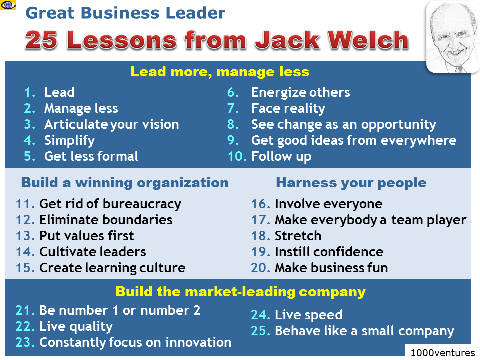Jack Welch's 20-70-10
I found it interesting to read Jack Welch's philosophy on management. He is probably one of the most renowned leaders of all time.
One of his most controversial point of view is the "Differenciation" policy, which is simply stated such: rank your people in 3 categories : Good/Average/Poor performers representing 20%/70%/10% of your staff.
You have a different treatment of each category. By getting rid of the 10% poor performers, you regularly get a better and better company. As simple as that - you just get rid of the bad apples.
The evolution to this is that you never stop this "selection" process, always getting rid of your 10% poor performers and keep shifting the wheat from the tares.
This very cut and dry process can be effective in honing your perfect company sales machine to its best performance and effectiveness. Is it conducive to a constructive company culture? Apparently, yes. If it worked for the most well-known leaders of all corporate history, it should be good enough for anyone, right?
A company I worked for was acquired by a conglomerate and started introducing KPI and performance standards very much in the similarity of the Jack Welch model where employees were ranked in categories 1-5 where five represented stellar performance and actionable cause for a promotion or a raise. It took some these assessment procedures to be implemented, but I have to say that it did feel a little awkward in the Nordic organisation where things had been done a specific way for some time. The change created a performance and number oriented culture and dehumanized the workforce - quite the opposite what the trend is today e.g. the way Zappos is building its work culture.
To each its own. Just don't forget Richard Branson's "happy employees, happy customers" philosophy - just saying that there are many ways you can build a great and successful company. Welch's model could be one of them. More food for thought later on this.
I found it interesting to read Jack Welch's philosophy on management. He is probably one of the most renowned leaders of all time.
One of his most controversial point of view is the "Differenciation" policy, which is simply stated such: rank your people in 3 categories : Good/Average/Poor performers representing 20%/70%/10% of your staff.
You have a different treatment of each category. By getting rid of the 10% poor performers, you regularly get a better and better company. As simple as that - you just get rid of the bad apples.
The evolution to this is that you never stop this "selection" process, always getting rid of your 10% poor performers and keep shifting the wheat from the tares.
This very cut and dry process can be effective in honing your perfect company sales machine to its best performance and effectiveness. Is it conducive to a constructive company culture? Apparently, yes. If it worked for the most well-known leaders of all corporate history, it should be good enough for anyone, right?
A company I worked for was acquired by a conglomerate and started introducing KPI and performance standards very much in the similarity of the Jack Welch model where employees were ranked in categories 1-5 where five represented stellar performance and actionable cause for a promotion or a raise. It took some these assessment procedures to be implemented, but I have to say that it did feel a little awkward in the Nordic organisation where things had been done a specific way for some time. The change created a performance and number oriented culture and dehumanized the workforce - quite the opposite what the trend is today e.g. the way Zappos is building its work culture.
To each its own. Just don't forget Richard Branson's "happy employees, happy customers" philosophy - just saying that there are many ways you can build a great and successful company. Welch's model could be one of them. More food for thought later on this.




 RSS Feed
RSS Feed
